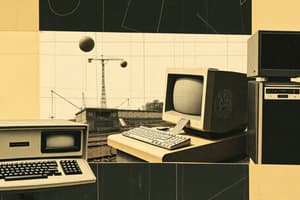Podcast
Questions and Answers
What was the significance of the Analytical Engine designed by Charles Babbage?
What was the significance of the Analytical Engine designed by Charles Babbage?
- It was the first fully functional computer.
- It was the first personal computer.
- It introduced the concept of a programmable digital computer. (correct)
- It revolutionized the internet.
The microprocessor was invented in the 1960s.
The microprocessor was invented in the 1960s.
False (B)
What type of computer is specifically designed for advanced graphic design or scientific simulations?
What type of computer is specifically designed for advanced graphic design or scientific simulations?
Workstation
The ___________ is known as the 'brain' of the computer, responsible for executing instructions.
The ___________ is known as the 'brain' of the computer, responsible for executing instructions.
Match the following types of computers with their primary use:
Match the following types of computers with their primary use:
Which of the following is NOT a key function of modern operating systems?
Which of the following is NOT a key function of modern operating systems?
A Local Area Network (LAN) can connect devices over a large geographic area.
A Local Area Network (LAN) can connect devices over a large geographic area.
What is the primary purpose of application software?
What is the primary purpose of application software?
The _____ is a global system of interconnected computer networks.
The _____ is a global system of interconnected computer networks.
Match the following computing concepts with their definitions:
Match the following computing concepts with their definitions:
Flashcards
CPU
CPU
The computer's brain, executing instructions.
RAM
RAM
Computer memory for data and instructions the CPU uses.
Storage
Storage
Stores data permanently. (e.g., hard drive).
Input Device
Input Device
Signup and view all the flashcards
Operating System (OS)
Operating System (OS)
Signup and view all the flashcards
Local Area Network (LAN)
Local Area Network (LAN)
Signup and view all the flashcards
Application Software
Application Software
Signup and view all the flashcards
Digital Divide
Digital Divide
Signup and view all the flashcards
Cloud Computing
Cloud Computing
Signup and view all the flashcards
Study Notes
History of Computing
- Early computing devices, such as the abacus and slide rule, predate modern computers by centuries.
- The first programmable digital computer, the Analytical Engine, was designed by Charles Babbage in the 19th century. Though never fully built, it conceptualized key aspects of modern computers.
- The development of the transistor and integrated circuit revolutionized computing in the mid-20th century, leading to smaller, faster, and more affordable computers.
- The invention of the microprocessor in the 1970s integrated the central processing unit (CPU) onto a single chip, enabling the development of personal computers.
- The internet's expansion dramatically changed computing by connecting computers globally and enabling the widespread sharing of information and resources.
Basic Components
- Central Processing Unit (CPU): The "brain" of the computer, responsible for executing instructions.
- Memory (RAM): Stores data and instructions currently being used by the CPU. Volatile and temporary; data is lost when the computer is turned off.
- Storage Devices (e.g., Hard Drive, SSD): Store data permanently, retaining information even after the computer is powered down.
- Input Devices (e.g., Keyboard, Mouse, Touchscreen): Allow users to input data and instructions into the computer.
- Output Devices (e.g., Monitor, Printer, Speakers): Display processed information to the user.
- Motherboard: The main circuit board that connects all computer components.
- Graphics Processing Unit (GPU): Specialized processor for handling image and video processing.
Types of Computers
- Personal Computers (PCs): Desktops and laptops, commonly used for personal and professional tasks.
- Workstations: Powerful computers designed for specific tasks, like advanced graphic design or scientific simulations.
- Servers: Computers dedicated to managing data and resources for multiple users on a network (e.g., web servers).
- Mainframes: Large and powerful computers used for processing massive amounts of data in large organizations (e.g., banks, government agencies).
- Supercomputers: The most powerful computers available, designed to perform complex calculations at extremely high speeds (e.g., scientific research, weather forecasting).
Operating Systems
- Operating System (OS): Software that manages computer hardware and software resources. Manages inputs and outputs, allocates processing power and memory, and provides a user interface.
- Examples: Windows, macOS, Linux.
- Key functions of modern OSs: File management, user authentication, resource allocation, and hardware interaction.
Software
- System Software: Controls and manages the computer hardware and other software; includes the Operating System (OS).
- Application Software: Programs used by users for specific tasks, like word processing, web browsing, and graphic design.
Computer Networks
- Local Area Network (LAN): Connects devices within a limited area, such as a home or office.
- Wide Area Network (WAN): Connects devices over a large geographic area, such as the internet.
- The Internet: A global system of interconnected computer networks.
Ethical Concerns
- Privacy: Data security and the protection of personal information.
- Security: Protecting computer systems from malicious attacks.
- Accessibility: Ensuring that computer technology is available to all users, despite potential disabilities.
- Digital divide: The gap in access to and use of technology between different socioeconomic groups.
- Intellectual Property: Ownership of software, data, and other digital creations.
Future of Computing
- Artificial intelligence (AI): Rapid development of AI is transforming many aspects of computing.
- Cloud computing: Storing data and running applications on remote servers accessible through the internet.
- Quantum computing: A new computing paradigm employing quantum physics to potentially solve complex problems.
- Internet of Things (IoT): The increasing connection of everyday devices to the internet, enabling data collection and automation.
- Mobile computing: Continued advancements in mobile devices, expanding their computing capabilities.
Studying That Suits You
Use AI to generate personalized quizzes and flashcards to suit your learning preferences.




